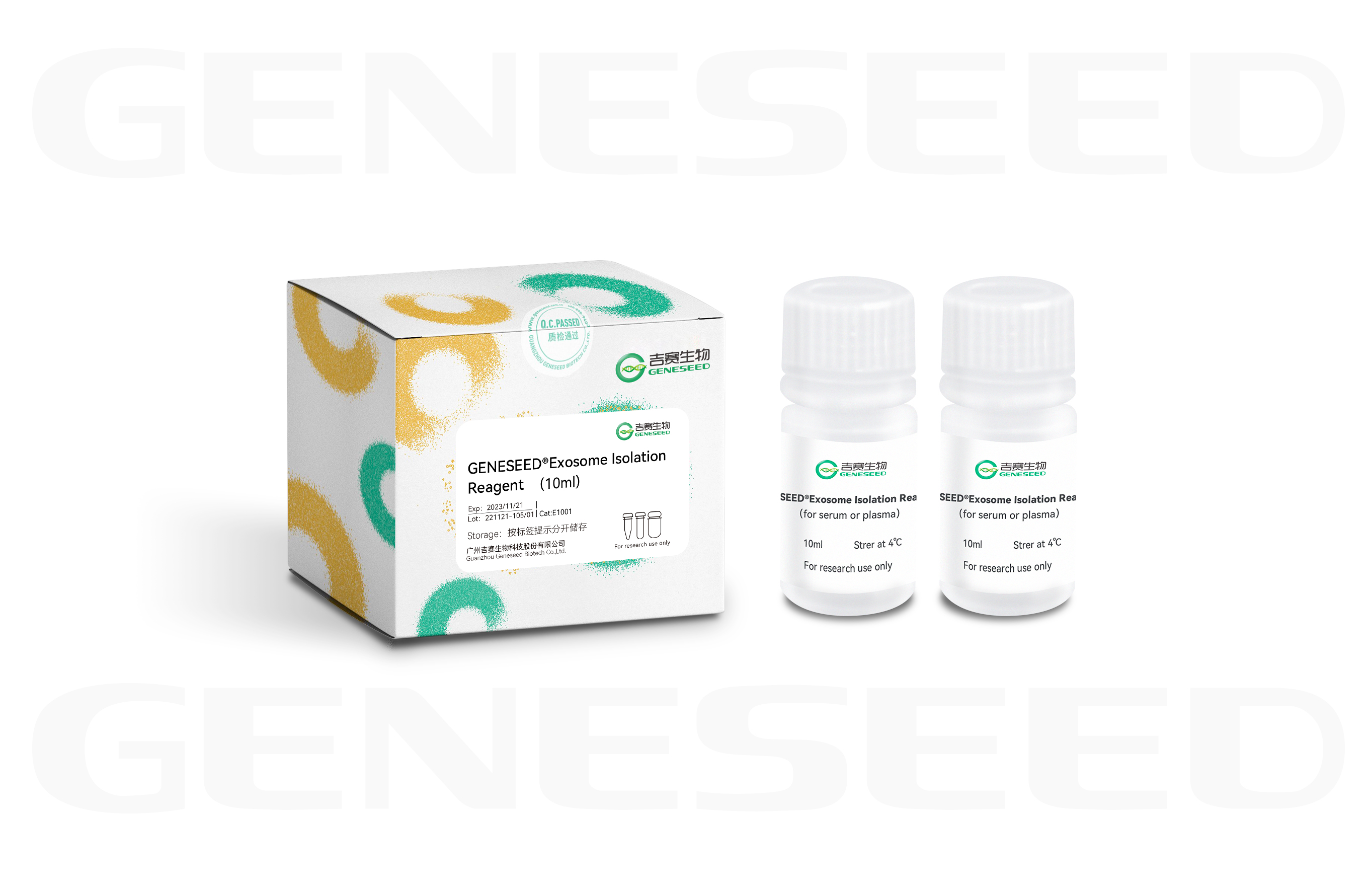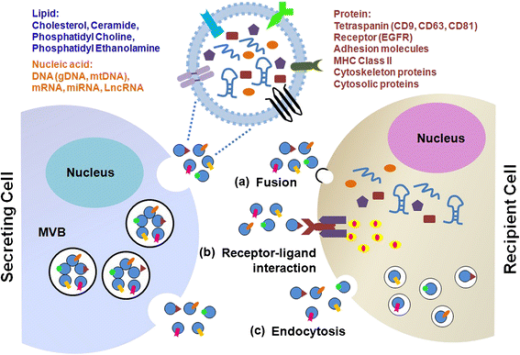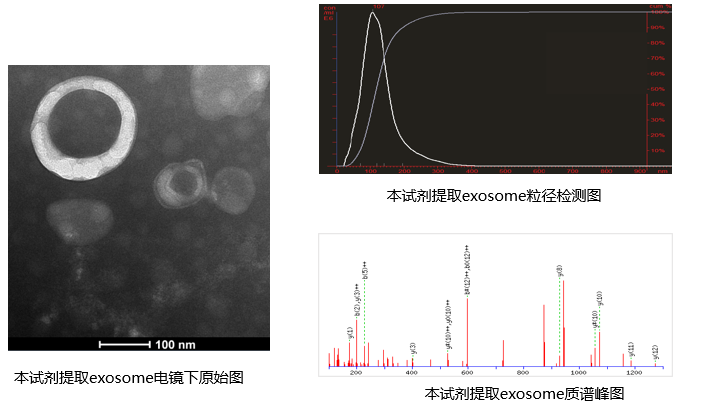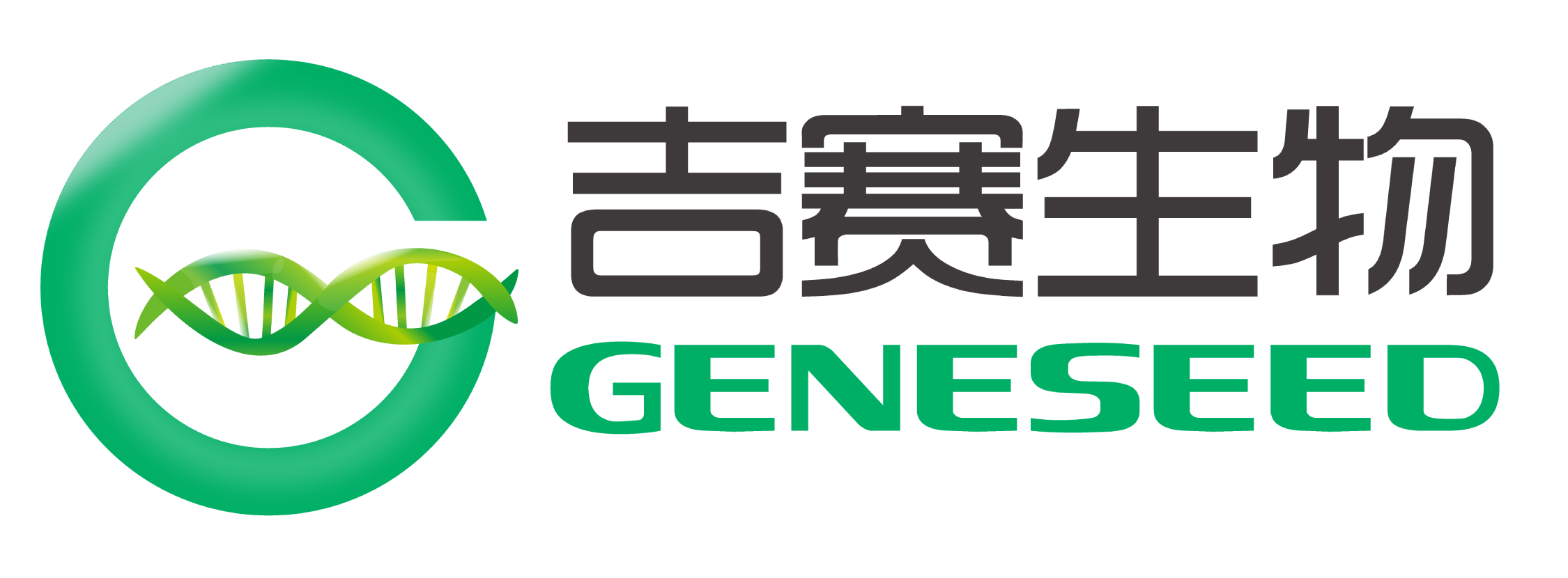- ·
外泌体提取试剂盒
- 产品介绍
- 客户文章
- 说明书下载
- Q&A

Exosome (外泌体)是体液中天然存在的、活细胞分泌的直径约为30-150nm的纳米级双层囊泡小体,它携带有很多的遗传物质和参与细胞活动调控的重要蛋白,可通过自分泌或旁分泌途径被细胞吸收,也可经循环系统被远距离靶组织或器官所吸收,能参与机体多种生理和病理过程。
近几年外泌体研究的持续升温,全球科研大咖纷纷扎堆此领域,有关外泌体载药、诊断、免疫疗法等方向的文章陆续发表在Science、Nature等各大顶级期刊上,外泌体已成为生命科学/基础医学研究的一大热点。
外泌体广泛的存在于体液中,如外周血、唾液、尿液、腹水、羊水、脑脊液等。然而,实验中分离到让人满意的外泌体并不是容易的事!

产品优势
1)操作简单,使用方便,无需超速离心,比传统方法省时省力。
2)高效分离,纯度高,富集量大,应用范围广。
3)获取的Exosome结构和功能完整。
4)可用于WB、ELISA、蛋白质谱、qPCR、测序等后续实验。
5)稳定性好,便于运输,便于保存。
性能展示

[1] IF8.579 Smooth muscle SIRT1 reprograms endothelial cells to suppress angiogenesis after ischemia. Theranostics
[2] IF8.079 Human umbilical cord mesenchymal stem cell-derived exosomal miR-335-5p attenuates the inflammation and tubular epithelial–myofibroblast transdifferentiation of renal tubular epithelial cells by reducing ADAM19 protein levels. Stem Cell Research & Therapy
[3] IF6.684 CircRNA_100395 Carried by Exosomes From Adipose-Derived Mesenchymal Stem Cells Inhibits the Malignant Transformation of Non-Small Cell Lung Carcinoma Through the miR-141-3p-LATS2 Axis. Frontiers in Cell and Developmental Biology
[4] IF6.543 Rat Bone Mesenchymal Stem Cell-Derived Exosomes Loaded with miR-494 Promoting Neurofilament Regeneration and Behavioral Function Recovery after Spinal Cord Injury. Oxidative Medicine and Cellular Longevity
[5] IF5.753 Exosomes secreted by chronic hepatitis B patients with PNALT and liver inflammation grade ≥ A2 promoted the progression of liver cancer by transferring miR-25-3p to inhibit the co-expression of TCF21 and HHIP. CELL PROLIFERATION
[6] IF5.249 TGF-β1-modified MSC-derived exosomal miR-135b attenuates cartilage injury via promoting M2 synovial macrophage polarization by targeting MAPK6. CELL AND TISSUE RESEARCH
[7] IF5.168 Characterization of the release and biological significance of cell-free DNA from breast cancer cell lines. Oncotarget
[8] IF4.627 YBX-1 mediated sorting of miR-133 into hypoxia/reoxygenation-induced EPC-derived exosomes to increase fibroblast angiogenesis and MEndoT. Stem Cell Research & Therapy
[9] IF4.219 The exosome-circ_0001359 derived from cigarette smoke exposed-prostate stromal cells promotes epithelial cells collagen deposition and primary ciliogenesis. TOXICOLOGY AND APPLIED PHARMACOLOGY
[10] IF3.743MiR-145 negatively regulates TGFBR2 signaling responsible for sepsis-induced acute lung injury. BIOMEDICINE & PHARMACOTHERAPY
[11] IF3.337 Exosomal-lncRNA DLEU1 Accelerates the Proliferation, Migration, and Invasion of Endometrial Carcinoma Cells by Regulating microRNA-E2F3. OncoTargets and Therapy
[12] IF3.304 TGF-β1 promoted chondrocyte proliferation by regulating Sp1 through MSC-exosomes derived miR-135b. CELL CYCLE
[13] IF2.967 Exosomes derived from HBV associated liver cancer promote chemoresistance by upregulating chaperone mediated autophagy. Oncology Letters
[14] IF2.759 MEG3 LncRNA from Exosomes Released from Cancer-Associated Fibroblasts Enhances Cisplatin Chemoresistance in SCLC via a MiR-15a-5p/CCNE1 Axis. YONSEI MEDICAL JOURNAL
[15] IF2.392 lncRNA-HEIH in serum and exosomes as a potential biomarker in the HCV-related hepatocellular carcinoma. Cancer Biomarkers
[16] IF1.62 miR-6718-5p and miR-4329 can be used as potential biomarkers for acute myocardial infarction. JOURNAL OF CARDIAC SURGERY
[17] IF1.313 The relationship between mouse lung adenocarcinoma at different stages and the expression level of exosomes in serum. Mathematical Biosciences and Engineering
[18] IF0.205 The exosome-mediated PI3k/Akt/mTOR signaling pathway in cervical cancer. International Journal of Clinical and Experimental Pathology
1.外泌体研究,应选用血浆还是血清?
血清是血液凝固之后收集的液体,所以其中少了纤维蛋白原,凝血因子,以及多了很多凝血产物。纤维蛋白原可转化为纤维蛋白,具有凝血功能。在凝血过程中血小板会分泌大量的外泌体,有研究发现血清中有接近50%的外泌体来自额外的分泌。
血浆=血液-血细胞 血清=血浆-纤维蛋白原-凝血因子
所以一般实验选择血浆,在特殊情况下,如研究与血小板相关的疾病的时候,当然是血清更适合。
2.外泌体提取试剂提取外泌体一般后续检测QPCR需要多少血浆呢?多少mL的血清或血浆提出来的外泌体够同时做RNA测序和蛋白质谱的吗?
1-2mL的血浆足够后续的QPCR检测;4mL的血清或血浆可满足RNA测序和蛋白质谱的需求。
3.如何鉴定提取出来的外泌体?
根据国际细胞外囊泡协会于2014年发表的一个指导手册(MISEV),鉴定外泌体首先需要通过WB来鉴定细胞外囊泡的标志蛋白是否存在于样品中,通过电子显微镜来观察样品中细胞外囊泡的形态特征,通过NTA等手段来分析样品中细胞外囊泡的群体特征(粒子浓度、直径分布等)
4.提取出来的外泌体能否应用于细胞共培养?
我们提取出来的外泌体通过粒径检测能判断其纯度(粒径大小均在外泌体的大小范围),电镜检测能判断其形态确为外泌体。如果样品中的外泌体有活性的话是可以进行细胞共培养的实验的。
5.外泌体如何保存?
纯化完成后的外泌体可分装成50-100uL后置于-80℃保存。
6.用吉赛的外泌体提取试剂盒从2mL血清血浆提取出来的外泌体能有多少?能满足后续的电镜和WB吗?BCA方法测定的蛋白浓度是多少?
2mL血清血浆提取出来的外泌体数量约1*10的8次方-9次方,可以满足。BCA方法测定的蛋白浓度为2~4ug/uL
7.外泌体电镜是不是一定要有膜结构,无膜结构的球体对不对?
负染电镜结果中外泌体的形态肯定是那种明显的茶托样或者大饼样的!边缘有一圈略微更明亮的亮圈。如果你打到的结构是没有膜结构的圆球形,那么您很可能看到了脂蛋白颗粒或者抱团的蛋白质。
8.为什么超速离心提取外泌体看不到沉淀?
这种问题通常有三种可能性:
其一:使用的细胞上清或者血清量太低,从而造成了这样的结果。
其二:使用了不透明的超速离心管,一般来说外泌体产量都比较小,所以凡是不透明的管子,基本都是很难见到明显沉淀的,可以当做有沉淀,然后操作下去即可。
其三:使用了角转。部分品牌离心机的角转管壁粘附性很低,超离结束没多久沉淀就会滑落下去,所以请在离心结束时赶紧去收样。
填写需求描述给我们
工具快速咨询
400-8989-400
geneseed@geneseed.com.cn

 购物车
购物车





 广州市黄埔区开源大道11号科技企业加速器A区6栋2楼
广州市黄埔区开源大道11号科技企业加速器A区6栋2楼


 geneseed@geneseed.com.cn
geneseed@geneseed.com.cn